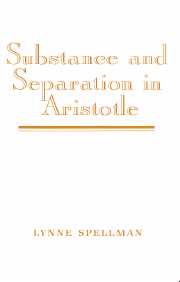Introduction
Published online by Cambridge University Press: 04 December 2009
Summary
We are sufficiently assured of this, then, even if we should examine it from every point of view, that that which entirely is is entirely knowable.
(Republic 477a)This is a study of Aristotle's theory of substance, more precisely of his theory of sublunary substance. Although some philosophers, upon reading the Metaphysics, see the influence of Aristotle's biology, others – and I am one of them – see Plato. Indeed (although Aristotle would not have put the point in this way), I would go so far as to say that Aristotle can be seen as attempting to offer a defensible version of Platonism. What I mean when I say “a version of Platonism” is that for Aristotle, as for Plato, there is something which is first in knowledge, definition, and time, and that for Aristotle, as for Plato, whatever is knowable must be eternal and unchanging. In the case of Plato, it is, of course, the Forms which are intended to meet these requirements. But Aristotle finds the Forms problematic on both metaphysical and epistemological grounds, and while Plato himself certainly struggled with some of the difficulties that Aristotle complains of, Aristotle believes that Plato's solutions fail, chiefly on account of separation. Specifically, Aristotle seems to believe that separation creates a gap that recollection cannot fully bridge and that Plato's blurring of the distinction between universality and particularity not only leads to regress but casts doubt upon the very intelligibility of Forms.
- Type
- Chapter
- Information
- Substance and Separation in Aristotle , pp. 1 - 4Publisher: Cambridge University PressPrint publication year: 1995



